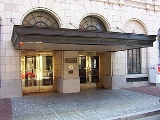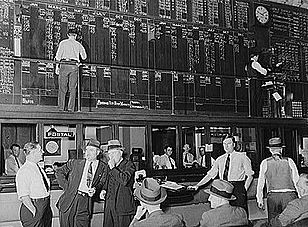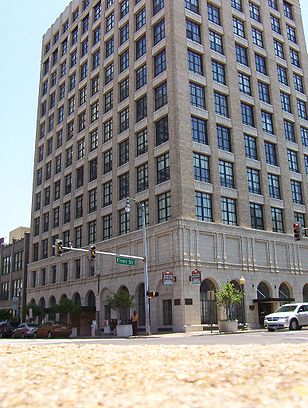
Memphis Cotton Exchange
Encyclopedia
The Memphis Cotton Exchange is located in downtown
Memphis
, Tennessee
, USA, on the corner of Front Street and Union Avenue. It was founded in 1874 as a result of the growing cotton market in Memphis. Cotton
merchants of the time became aware of the need for a trade organization to regulate cotton marketing in the city. They were also aware of the many benefits reaped by the New York Cotton Exchange
and the New Orleans Cotton Exchange
. Once established, the exchange produced rules and regulation on cotton trading and set standards for buying and pricing cotton in Memphis and the Mid-South.
Cotton trading was done on the first floor and only members of the exchange were allowed to trade there. In 1978 the trading floor was closed in favor of computer trading. The historic floor has since then been remodeled and is now home to The Cotton Museum
and is used to educate the public about the industry and agriculture of cotton that helped build the city of Memphis in its early years.
in Memphis. This building housed the Cotton and Merchant Exchanges, and has since been renovated as an apartment building. The tall 20 story Exchange Building
was built in 1910, and should not be confused with the Memphis Cotton Exchange building on Union Street.


Downtown Memphis, Tennessee
Downtown Memphis, Tennessee is the central business district of Memphis, Tennessee and is located along the Mississippi River between Interstate 40 to the north, Interstate 55 to the south and I-240 to the east, where it abuts Midtown Memphis....
Memphis
Memphis, Tennessee
Memphis is a city in the southwestern corner of the U.S. state of Tennessee, and the county seat of Shelby County. The city is located on the 4th Chickasaw Bluff, south of the confluence of the Wolf and Mississippi rivers....
, Tennessee
Tennessee
Tennessee is a U.S. state located in the Southeastern United States. It has a population of 6,346,105, making it the nation's 17th-largest state by population, and covers , making it the 36th-largest by total land area...
, USA, on the corner of Front Street and Union Avenue. It was founded in 1874 as a result of the growing cotton market in Memphis. Cotton
Cotton
Cotton is a soft, fluffy staple fiber that grows in a boll, or protective capsule, around the seeds of cotton plants of the genus Gossypium. The fiber is almost pure cellulose. The botanical purpose of cotton fiber is to aid in seed dispersal....
merchants of the time became aware of the need for a trade organization to regulate cotton marketing in the city. They were also aware of the many benefits reaped by the New York Cotton Exchange
New York Cotton Exchange
The New York Cotton Exchange was a commodities exchange founded in 1870 by a group of one hundred cotton brokers and merchants at 1 Hanover Square in New York City.- History :...
and the New Orleans Cotton Exchange
New Orleans Cotton Exchange
The New Orleans Cotton Exchange was established in New Orleans, Louisiana, in 1871 as a centralized forum for the trade of cotton. It operated in New Orleans until closing in 1964...
. Once established, the exchange produced rules and regulation on cotton trading and set standards for buying and pricing cotton in Memphis and the Mid-South.
Cotton trading was done on the first floor and only members of the exchange were allowed to trade there. In 1978 the trading floor was closed in favor of computer trading. The historic floor has since then been remodeled and is now home to The Cotton Museum
The Cotton Museum
The Cotton Museum, located in Memphis, Tennessee, U.S., is an historical and cultural museum that opened in March 2006 on the former trading floor of the Memphis Cotton Exchange at 65 Union Avenue in downtown Memphis....
and is used to educate the public about the industry and agriculture of cotton that helped build the city of Memphis in its early years.
History & Location
The Memphis Cotton Exchange was once housed in the Exchange Building on 9 North Second StreetExchange Building, Memphis
The Exchange Building is a 19-story skyscraper, which was formerly known as the Cotton Exchange Building and the Merchants Exchange Building, and is the twelfth tallest building in Memphis, Tennessee. It should not be confused with the Memphis Cotton Exchange which is located on Front Street and...
in Memphis. This building housed the Cotton and Merchant Exchanges, and has since been renovated as an apartment building. The tall 20 story Exchange Building
Exchange Building, Memphis
The Exchange Building is a 19-story skyscraper, which was formerly known as the Cotton Exchange Building and the Merchants Exchange Building, and is the twelfth tallest building in Memphis, Tennessee. It should not be confused with the Memphis Cotton Exchange which is located on Front Street and...
was built in 1910, and should not be confused with the Memphis Cotton Exchange building on Union Street.
Presidents of the Memphis Cotton Exchange


| 1873-1876 W. B. Galbreath 1876-1879 J. T. Pettit 1879-1881 D. P. Hadden 1881-1883 Napoleon Hill 1883-1885 C. P. Hunt 1885-1887 W. J. Crawford 1887-1889 L. B. Suggs 1889-1891 Emmett L. Woodson 1891-1893 H. M. Neely 1893-1895 E. B. Carroll 1895-1897 I. McD. Massey 1897-1899 F. M. Norfleet 1899-1900 C. C. Cowan 1900-1901 W. A. Gage 1901-1902 Cleland K. Smith 1902-1903 N. C. Richards 1903-1904 E. W. Porter 1904-1905 E. F. Webber 1905-1906 Dennis Smith 1906-1907 J. J. Shoemaker 1907-1908 F. M. Crump 1908-1909 R. S. Bryan 1909-1910 John Sneed Williams 1910-1911 W. J. Abston 1911-1912 John Sneed Williams 1912-1913 F. G. Barton 1913-1914 C. W. Butler 1914-1915 C. A. Lacy 1915-1916 B. B. Beecher 1916-1917 George W. Fisher 1917-1918 D. S. Weaver 1918-1919 W. L. McKee 1919-1920 I. H. Barnwell 1910-1921 J. L. Cooke 1921-1922 W. J. Britton 1922-1923 J. P. Norfleet 1923-1924 Ben G. Humphreys 1924-1925 H. G. Thompson 1925-1926 S. B. Wilson 1926-1927 R. B. Barton 1927-1928 J. C. Lutz 1928-1929 W. W. Trigg 1929-1930 F. B. Smithwick 1930-1931 I. H. Barnwell, Jr. |
1931-1932 Everett R. Cook 1932-1933 F. G. Barton 1933-1934 Henry H. Haizlip 1934-1935 Frank T. Donelson 1935-1936 Caffey Robertson 1936-1937 George J. Eckert 1937-1938 C. L. Andrews 1938-1939 W. A. Wooten 1939-1940 Fred W. Lucas 1940-1941 C. W. Hussey 1941-1942 Russell C. Gregg 1942-1943 John A. DuPre 1943-1944 S. Y. West 1944-1945 N. F. Dalrymple 1945-1946 T. F. Jackson, Jr. 1946-1947 Robert J. Hussey 1947-1948 Thomas J. White 1948-1949 Mather T. Richards 1949-1950 A. M. Crawford 1950-1951 John S. Dillard 1951-1952 C. L. Patton 1952-1953 H. R. Altick 1953-1954 Parks Kinnett 1954-1955 Lewis K. McKee 1955-1956 J. W. Johnson 1956-1957 J. W. Ramsey 1957-1958 William Dunavant William Dunavant William Dunavant, better known as Billy Dunavant is one of the leaders in the cotton industry. -Early life:Billy Dunavant was born on December 19, 1932 to William and Dorothy Dunavant. He was educated first at the McCallie School in Chattanooga, then at Vanderbilt University, and finally received... 1958-1959 F. M. Crump 1959-1960 J. T. Murff 1960-1961 Berry B. Brooks 1961-1962 Hugh Francis 1962-1963 William W. Deupree 1963-1964 Eric D. Hirsch 1964-1965 H. D. Taylor 1965-1966 Robert J. Hussey 1966-1967 Hugh Francis 1967-1968 R. H. Allen, Jr. 1968-1969 Frank G Barton, Jr. 1969-1970 Walter Walsh 1970-1971 Berry B. Brooks 1971-1972 R. G. Gardner 1972-1973 Earl Crocker 1973-1974 Molloy H. Miller 1974-1975 Frank M. Weathersby |
External links
- http://www.memphiscottonexchange.org Memphis Cotton Exchange

